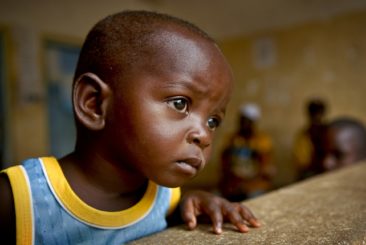
Scrolling through Facebook these days can be a dangerous venture. And let’s not even talk about reading the actual news. With all the disheartening stories in the cycle, one would think the news about Madonna’s recent adoption of twin girls from Malawi would be uplifting, not discouraging. But when I read the story, my heart broke a little bit more for the vulnerable children around the world.
In many countries, upwards of 80% of children who live in an orphanage have at least one living parent—something many people outside the situation don’t realize. Take a moment and let that sink in: eight out of every ten children living in institutional care have a living parent. Children are not in orphanages due to lack of a family; the number one cause of children being placed in an orphanage is poverty. On top of this troubling fact, numerous studies show that growing up in an orphanage can be extensively detrimental to a child’s well-being, physically, emotionally, and spirituality.
Children are not in orphanages due to lack of a family; the number one cause of children being placed in an orphanage is poverty.
Returning to Madonna’s story, you may note that Madonna is providing a family for these girls—that has to be a good thing, right? I don’t want to pretend I know all the facts in this specific situation (mainly because I don’t have weekly phone chats with Madonna), but given the statistics above, it is quite possible that these girls have either a living parent or other family. One USA Today article even claims that the birth father was present for the court hearing, citing his lack of resources as the reason his twin girls were in an orphanage—but since news outlets are inconsistent in reporting on this specific detail, I won’t take it as Gospel truth.
Forbes quotes Madonna’s net worth to be around $520 million. With this outrageous amount of money, the superstar could easily help the girls’ family set up a small, sustainable business. This would enable the family to generate their own income. If a biological family member could not be found, a similar situation could be set up with a local foster family. This would not only empower a family within the community to care for the children, it could also work toward breaking the cycle of poverty that causes so many children to be placed in orphanages in the first place.
What I am suggesting is a model known as the continuum of care, which outlines best practices in caring for children who are at risk for being separated from parental care, or who have already been separated. Many organizations have their own model, but most of them adhere to the same general principles. Family preservation or reunification is the first and best option, followed by alternative local family options. In her zeal to care for the vulnerable children of Malawi, I think Madonna skipped a few steps.
High profile cross-country celebrity adoptions like this one can spur on the overuse of orphanages. Some experts even believe that it can cause orphanages to recruit children for international adoptions to make a profit. Many families who “agree” to have their children adopted do not understand the legality and permanency of the adoption. They often believe it is simply akin to a study abroad program, and that their children will eventually come home. I am not saying Madonna is an awful person, or that her organization does not do an immense amount of good in a very impoverished country. Far from it. What I am saying is that there are a lot of misconceptions about orphanages and the harm they can cause the children living in them. I am saying we can, and should, do better.
There are a lot of misconceptions about orphanages, and the harm they can cause the children living in them. I am saying we can, and should, do better.
Evangelicals, especially American evangelicals, have a long history of supporting orphanages. From the work of missionaries like Amy Carmichael and George Muller, to the numerous modern evangelical churches which support orphanages, it is difficult to be in evangelical circles and not hear about this type of work. I believe this desire comes from a huge heart that longs to care for suffering children around the world. This heart has been molded by numerous calls from the Biblical text to care for the orphaned and vulnerable children. It is a good heart. I fear, however, that this heart has been misled. It has jumped too quickly to the orphanage model, and even international adoption, as the cure-all to the enormous issues facing vulnerable children around the world. I know my heart did.
As a young girl I felt that God was calling me to start an orphanage. Then I visited one in Tegucigalpa, Honduras. At this orphanage I met multiple children with living parents. Many of these children knew they had living parents. This shocked and confused me. It also crushed my dreams in all the best ways. Since then, I have picked up the pieces of this dream and have molded it into a new one—or, rather, into several dreams. First, I dream that every child has the opportunity to be healthy, thriving, and happy, in her or his own family. Second, I dream that there would be a more robust understanding of why orphanages are often a part of the problem, and not the best solution. Third (I have a lot of dreams!), I dream that I, alongside the global church, can continue to learn about holistic ministry models that best benefit vulnerable children. Because these children, just like our own children, deserve the best. And at the end of the day, the best is often the chance to be raised by their own family.
For more information regarding statistics and best practices in caring for vulnerable children, check out the following links:
Faith to Action
Better Care Network
Lumos
For more information regarding organizations working to keep kids in families, and subsequently out of orphanages, visit the following websites:
Casa Viva
Child’s i Foundation
Abide Family Center
Lyndsay Mathews is a graduate of Fuller Theological Seminary, where she received a M.A. in Intercultural Studies with an emphasis in at-risk children. After graduating in 2015, she spent a year working alongside the incredible staff at Abide Family Center located in Jinja, Uganda. Abide works to keep children in their families and out of orphanages. Currently, she writes for various organizations about the importance of family preservation in developing countries.



One Response
I imagine Madonna is coming from her grand heart but just does not realize there are other options. Perhaps the UN could promote the better choice here for families…to support them with a sustainable way of earning a living so they may take care of their children themselves. Definitely, someone should apprise the wealthy celebrities of this option.